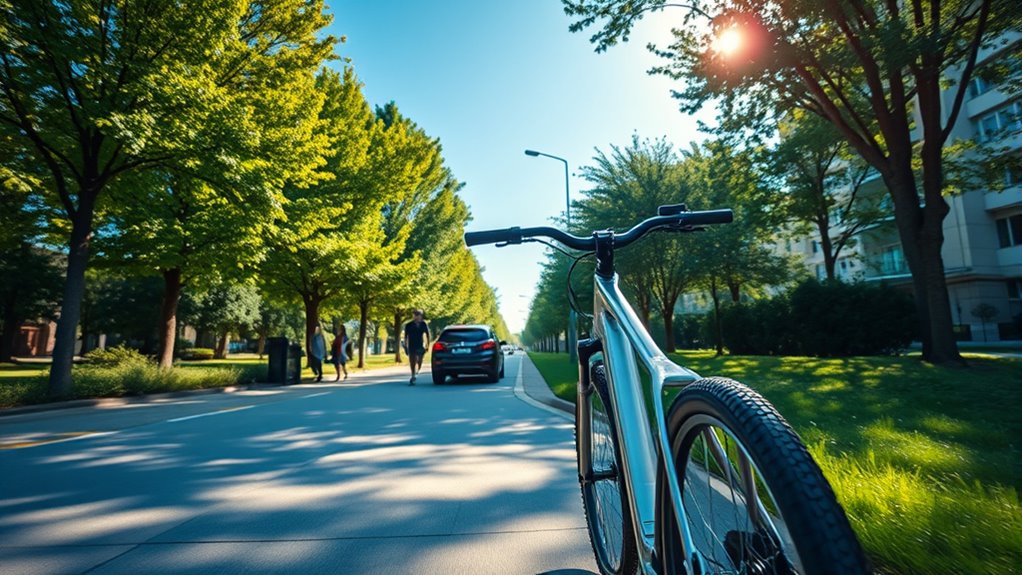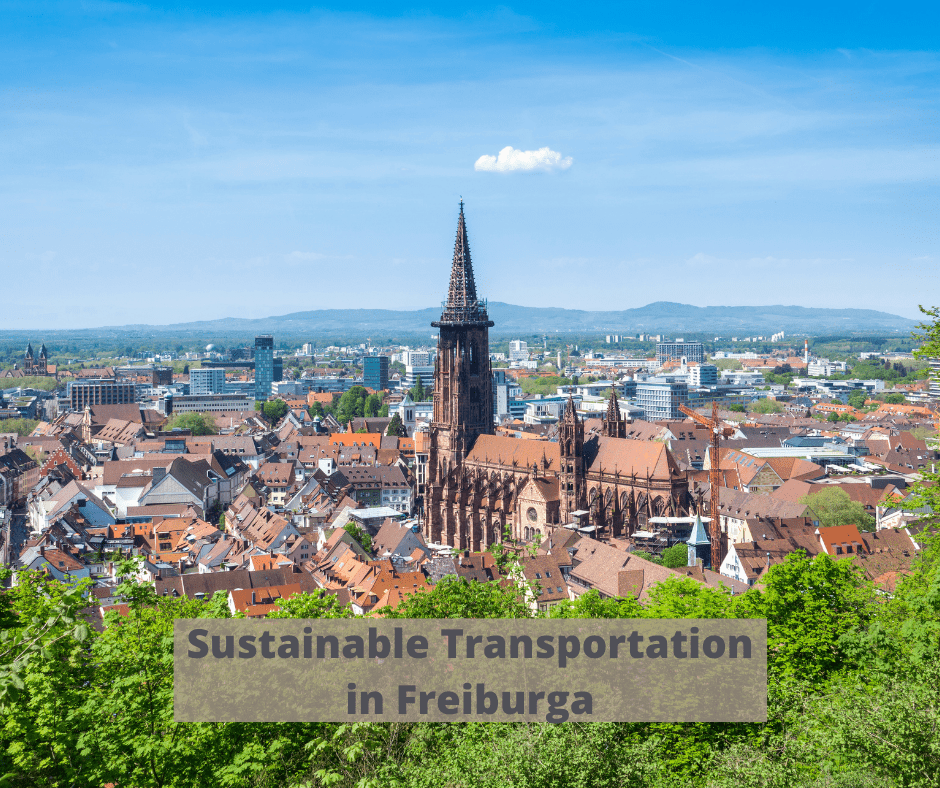E-bikes are far more eco-friendly than cars because they produce much fewer emissions during manufacturing and use. They require less raw material, energy, and space, which cuts down their carbon footprint. Plus, they generate minimal noise and pollution, helping protect wildlife and improve urban air quality. Switching to e-bikes can profoundly reduce your personal carbon impact and urban congestion. Stay with us to discover how this sustainable choice can benefit your community and the environment.
Key Takeaways
- E-bikes produce significantly fewer CO2 emissions during manufacturing and use compared to cars.
- They consume 10-20% of the energy per mile, reducing overall fossil fuel demand.
- E-bikes generate minimal noise pollution, benefiting urban ecosystems and wildlife.
- They occupy less space, easing traffic congestion and preserving urban green areas.
- Switching to e-bikes lowers personal carbon footprints and reduces greenhouse gas emissions.
E-bike Manufacturing and Its Smaller Carbon Footprint

Manufacturing an e-bike produces far fewer CO2 emissions than building a car, thanks to its smaller size and lighter weight. When you choose electric bikes, you’re reducing your overall carbon footprint from the start. E-bikes use lighter materials like aluminum or carbon fiber, which require less energy to produce than the steel and complex parts found in cars. The environmental impact of manufacturing an e-bike is roughly 100 to 300 kilograms of CO2, markedly less than the 6 to 35 metric tons for a typical car. Thanks to fewer raw materials and simpler assembly, e-bike production consumes less energy and resources. Lightweight materials also contribute to their environmental benefits by reducing manufacturing emissions. Additionally, the smaller size of e-bikes allows for more sustainable manufacturing processes, further minimizing environmental impact. Modern manufacturing techniques, such as efficient assembly methods, enhance these benefits by reducing waste and energy use. Overall, electric bikes offer a much smaller carbon footprint during manufacturing, making them a more sustainable transportation option from the outset.
Emissions Savings From Gasoline Production

Producing gasoline for vehicles generates a massive environmental impact that extends beyond tailpipe emissions. Each million tons of gasoline results in between 59,000 and 328,000 tons of CO2 emissions during production, highlighting its considerable footprint. Americans’ annual fuel consumption of roughly 130 billion gallons leads to an estimated 240 million to 1.3 trillion tons of CO2 emitted from gasoline production alone. The environmental costs of extracting, refining, and transporting fuel far outweigh the emissions produced during vehicle use. The energy-intensive processes involved in gasoline refining contribute significantly to greenhouse gas emissions. Additionally, the carbon footprint of fuel supply chains is substantial, as transportation and storage further increase the overall environmental impact. By switching to electric bikes, you reduce the demand for gasoline, cutting the associated CO2 emissions from fuel supply chains. This shift not only lowers tailpipe pollution but also markedly decreases the environmental impacts linked to gasoline production, making electric bikes a cleaner, more sustainable transportation option. Inspirational quotes about fatherhood can remind us of the importance of caring for our environment for future generations.
Reduction in Emissions From Fuel Combustion During Use

Switching from cars to e-bikes considerably cuts down the emissions generated during travel, primarily because electric bikes produce far less CO₂ per mile. During use, an electric bike emits roughly 300 kg of CO₂ annually over 15,000 miles, compared to about 7,000 kg for cars. This significant reduction stems from the fact that CO₂ emissions from an e-bike mainly come from electricity needed for charging, not from exhaust fumes. By choosing an electric bike, you can cut your fuel-related carbon emissions by up to 50%. Additionally, electric bikes for camping offer a sustainable alternative for outdoor adventures.
- Electric Bike’s lower carbon footprint during daily travel
- Reduced emissions from electricity use for charging
- Less reliance on gasoline and fossil fuels
- Less engine exhaust emissions
- Overall decrease in the carbon generated from fuel combustion
Lower Energy Consumption and Waste Generation
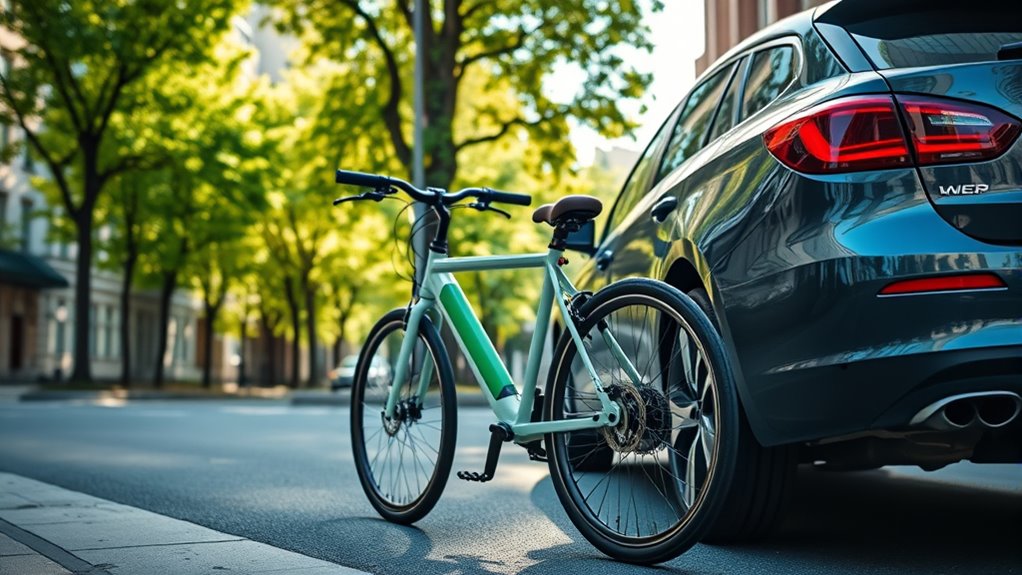
Since electric bikes require much less energy to operate than cars, they substantially reduce overall energy consumption. You’ll use only about 10-20% of the electricity that a typical vehicle demands per mile, making e-bikes a more efficient choice. Additionally, their manufacturing process uses fewer raw materials and less energy, decreasing their carbon footprint. During operation, e-bikes generate minimal waste because they produce no emissions and have fewer disposable parts. Their tires last up to 4,000 miles, which means less resource use for production and disposal compared to car tires. Recycling and disposing of e-bike components also has a lower environmental impact due to their simpler design and smaller size. Furthermore, the cost savings associated with e-bikes make them a sustainable transportation option for many users. The use of renewable energy for charging can further enhance their environmental benefits. Overall, e-bikes help you reduce both energy use and waste generation.
Noise Pollution and Wildlife Preservation

Switching to e-bikes considerably reduces noise pollution in cities, creating a quieter environment for everyone. This calmer atmosphere helps protect wildlife from the stress and disruption caused by loud traffic. By choosing e-bikes, you contribute to preserving natural habitats and supporting urban peace. Additionally, reducing noise levels can improve overall website performance metrics, making urban spaces more pleasant for residents and visitors alike. Incorporating environmental factors can further enhance urban living by promoting greener and more peaceful communities. Promoting Dynamic Communication Exercises for Couples can also foster community bonds that support environmental awareness and collective action.
Reduced Noise Levels
E-bikes produce almost no noise, making them much quieter than cars that generate around 70 decibels at 65 mph. This reduction in noise pollution offers significant environmental benefits, especially in urban areas. Lower noise levels help decrease stress and health risks linked to traffic noise. They also lessen disturbances to wildlife, reducing habitat disruption and animal stress caused by loud vehicles. Additionally, quieter transportation options contribute to noise pollution reduction, supporting healthier ecosystems and communities. By choosing e-bikes, you contribute to quieter communities and healthier ecosystems. These quieter vehicles help minimize the harmful effects of noise pollution on both humans and animals. The adoption of e-bikes plays a vital role in creating a more peaceful environment.
Wildlife Conservation Benefits
The quiet operation of e-bikes offers substantial advantages for wildlife preservation by reducing noise pollution in natural and urban environments. Unlike cars that emit about 70-84 decibels, e-bikes operate nearly silently, helping prevent wildlife from being startled or disoriented. This lower noise level reduces stress and health risks for animals, fostering healthier ecosystems. It also decreases the chances of vehicle-wildlife collisions, which cause over a million animal deaths worldwide daily. By minimizing human-made noise, e-bikes support wildlife conservation efforts, protecting habitats from noise-related disruptions. This quieter alternative allows animals to go about their routines without disturbance, promoting more stable and balanced ecosystems. Additionally, employing noise pollution reduction strategies like e-bikes can lead to long-term benefits for biodiversity preservation. Incorporating sustainable transportation options can further enhance conservation outcomes. Ultimately, e-bikes contribute to preserving wildlife and enhancing biodiversity by considerably lowering noise pollution.
Urban Space Efficiency and Public Health Advantages
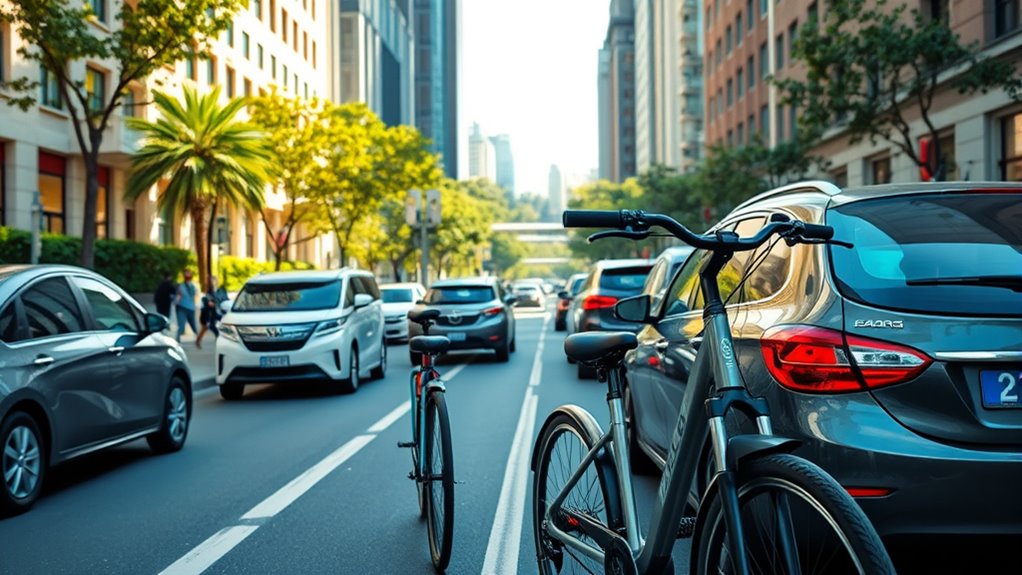
Because they take up much less space than cars, e-bikes allow cities to maximize their urban space for parks, pedestrian zones, and other public amenities. This reduces congestion and frees land for green areas, improving the city’s overall environment. E-bikes also promote public health by encouraging active transportation, which increases physical activity and reduces sedentary lifestyles. Their reduced emissions lead to better air quality, lowering respiratory health risks. Additionally, quiet operation minimizes noise pollution, creating calmer urban environments that support mental well-being. By integrating e-bikes into city life, you help optimize urban space and foster healthier communities.
E-bikes optimize urban space, reduce congestion, improve air quality, and promote healthier, calmer city environments.
- Frees land for parks and green spaces
- Eases traffic congestion in dense areas
- Promotes physical activity and fitness
- Improves air quality and respiratory health
- Reduces noise pollution and stress
Transitioning to a Sustainable Transportation System

Switching to e-bikes helps cut down your carbon footprint, especially when powered by renewable energy. This shift also makes urban areas more accessible and less congested, encouraging sustainable mobility. By choosing e-bikes, you support a cleaner, more energy-efficient transportation system that benefits everyone.
Reducing Carbon Emissions
Changing from traditional cars to e-bikes offers a powerful way to cut your personal carbon footprint considerably. By making this switch, you can reduce your carbon emissions by up to 50% on daily commutes, directly lowering the environmental impact of transportation. Manufacturing an e-bike produces far fewer CO2 emissions—between 6 to 35 metric tons—compared to hundreds of tons for a car’s lifespan. Replacing just 10% of short car trips with e-bike rides can eliminate millions of tons of greenhouse gases annually. Additionally, e-bikes consume much less energy, equivalent to 1,000 miles per gallon, reducing fossil fuel reliance. This shift supports global efforts to decarbonize transportation and build a more sustainable future.
- Lower personal carbon emissions
- Reduced manufacturing emissions
- Significant decrease in urban greenhouse gases
- Lower energy consumption
- Enhanced environmental impact
Promoting Urban Mobility
Adopting e-bikes in urban areas can considerably improve mobility and reduce congestion. As electric vehicles, e-bikes occupy less parking space and ease traffic flow, helping to optimize land use in cities. Moving from cars to e-bikes lowers traffic volume and emissions, contributing to better air quality and a healthier environment. E-bikes also support the development of dedicated bike lanes and pedestrian zones, making active transportation safer and more accessible. This shift encourages healthier lifestyles by incorporating physical activity into daily commutes and short trips. Infrastructure investments in bike-friendly facilities further enhance e-bike usability, making sustainable urban mobility more practical and appealing. Embracing e-bikes as part of urban transportation promotes a more efficient, cleaner, and livable city environment.
Supporting Renewable Energy
Integrating renewable energy sources into e-bike charging infrastructure can substantially enhance their environmental advantages. When powered by wind, solar, or hydropower, e-bikes’ lifecycle emissions drop near zero, making them a truly environmentally conscious choice. Increasing renewable energy use for electricity generation amplifies e-bikes’ potential as a sustainable transportation option. Policy incentives can accelerate this shift, encouraging the development of greener urban mobility. As renewable energy becomes more widespread globally, the carbon footprint of e-bike transportation will continue to decrease. By supporting renewable energy, you help maximize the eco-friendly benefits of e-bikes and contribute to a cleaner, healthier planet.
- Reduce lifecycle emissions with renewable energy
- Power e-bikes using wind, solar, or hydro
- Encourage policies for renewable integration
- Support global growth of renewable energy
- Enhance e-bikes as sustainable transport
Promoting Adoption Through Incentives and Community Support
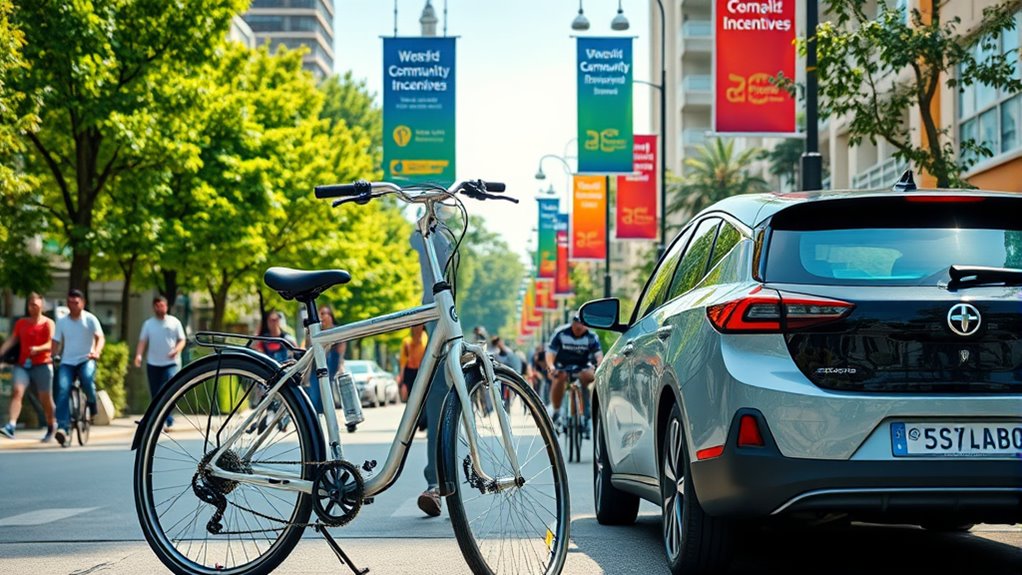
Have you considered how incentives and community programs can boost e-bike adoption? E-bike incentives like tax credits and rebates motivate you to choose cleaner transportation, lowering emissions. Community programs that offer free or subsidized e-bike rentals make sustainable commuting more accessible, especially in urban areas. Developing dedicated bike lanes and charging infrastructure supports your ability to ride safely and conveniently. Local governments can implement policies that promote e-bike sharing systems, decreasing reliance on fossil-fuel vehicles. Educational campaigns highlighting the environmental benefits of e-bikes help you understand their positive impact and encourage you to adopt this greener mode of transportation. By combining incentives with community support, we can make e-bikes a practical and appealing choice for more people.
Embracing a Greener Future With E-Bikes
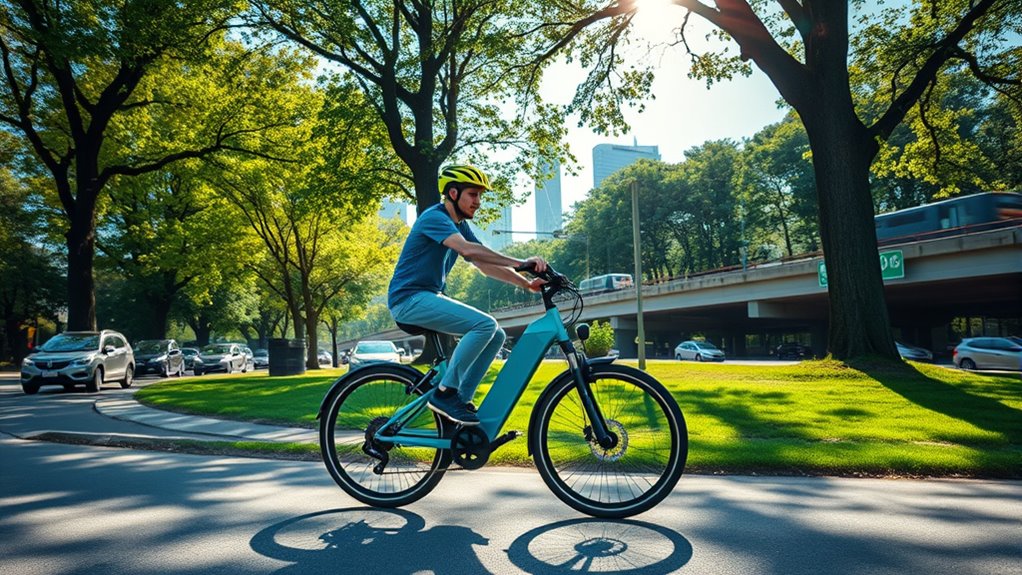
Embracing a greener future with e-bikes offers a practical way to reduce your environmental impact. By choosing electric bikes over cars, you substantially cut greenhouse gas emissions, especially when powered by renewable energy. E-bikes require fewer raw materials and energy during manufacturing, lowering their overall environmental footprint. Moving from a car to an e-bike can slash your personal carbon emissions by up to 50%, making urban commuting more sustainable. Additionally, e-bikes produce minimal noise pollution, helping to decrease urban noise levels and protect wildlife. Widespread adoption can also ease urban congestion and lessen the environmental impact of transportation infrastructure.
- Reduce greenhouse gases with electric power
- Lower resource consumption during manufacturing
- Cut personal carbon emissions substantially
- Minimize noise pollution in cities
- Alleviate urban congestion for a cleaner environment
Frequently Asked Questions
Are Electric Bikes Better for the Environment Than Cars?
You might wonder if electric bikes are better for the environment than cars. The answer is yes. E-bikes produce up to 90% fewer greenhouse gases over their lifespan, require fewer resources to manufacture, and emit no operational emissions. They use far less energy per mile, making them a cleaner, more sustainable transportation option. Switching to an e-bike helps reduce your carbon footprint and protects the environment considerably.
How Much CO2 Is Saved by Electric Cars?
When you ask how much CO₂ electric cars save, you’re looking at a significant reduction compared to traditional vehicles. Electric cars emit about 2,500 to 4,000 kg of CO₂ over 15,000 miles, which is much lower than gas-powered cars. By choosing electric, you cut your emissions by roughly 50-60%. This switch helps reduce your carbon footprint, making your daily commute more eco-friendly and contributing to cleaner air.
What Are the Disadvantages of Electric Vehicles on the Environment?
You should know that electric vehicles have some environmental downsides. Their batteries require resource-heavy mining, which damages ecosystems. Manufacturing emits a lot of greenhouse gases, and charging them can still rely on fossil fuels, reducing their eco-friendliness. Plus, disposing of or recycling batteries is complex and hazardous. Building charging stations also impacts land and resources. So, while EVs help reduce emissions, they aren’t entirely eco-friendly and carry environmental costs.
What Is the Carbon Footprint of the Ebike?
Imagine you’re choosing between an e-bike and a car for daily commuting. The e-bike’s carbon footprint is remarkably low—its lifecycle emissions are about 1,000 times less than a car’s. Production emits less CO₂, especially with recycling improvements, and during use, it produces almost zero emissions if powered by renewable energy. So, by riding an e-bike, you profoundly reduce your overall environmental impact.
Conclusion
By choosing e-bikes over cars, you reduce emissions, save energy, and protect wildlife. You cut costs, ease congestion, and improve your health. You embrace sustainability, support communities, and inspire change. You ride toward a cleaner air, a quieter city, and a greener future. You make a difference every time you pedal. Because when you ride an e-bike, you’re not just moving — you’re shaping a better world for everyone.
